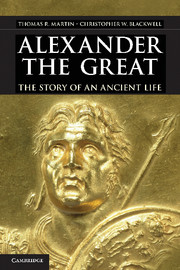Book contents
- Frontmatter
- Contents
- Acknowledgments
- Introduction: The Goal of this Book
- Map 1: European Greece, Macedonia, and Northern Lands
- Map 2: Alexander's Expedition
- 1 The World of Alexander's Birth and His Education in Literature and Warfare (350s and 340s BC)
- 2 Opportunities and Risks asa Teenager (340s to 338 BC)
- 3 The Danger in Replacing a Murdered Father as King (337 to 335 BC)
- 4 The Opening Battles Against the Persian Army (334 to 332 BC)
- 5 Finding God in Egypt and Capturing the Riches of Persia (332 to 330 BC)
- 6 Winning the World as King of Asia (330 to 329 BC)
- 7 Murder, Marriage, and Mixing Customs in Afghanistan (329 to 327 BC)
- 8 Victory and Frustration in India (327 to 326 BC)
- 9 Returning to Babylon and Becoming Divine (326 to 323 BC)
- 10 Remembering and Judging Alexander (323 BC to Now)
- Suggested Readings
- Index
2 - Opportunities and Risks as a Teenager (340s to 338 BC)
Published online by Cambridge University Press: 05 November 2012
- Frontmatter
- Contents
- Acknowledgments
- Introduction: The Goal of this Book
- Map 1: European Greece, Macedonia, and Northern Lands
- Map 2: Alexander's Expedition
- 1 The World of Alexander's Birth and His Education in Literature and Warfare (350s and 340s BC)
- 2 Opportunities and Risks asa Teenager (340s to 338 BC)
- 3 The Danger in Replacing a Murdered Father as King (337 to 335 BC)
- 4 The Opening Battles Against the Persian Army (334 to 332 BC)
- 5 Finding God in Egypt and Capturing the Riches of Persia (332 to 330 BC)
- 6 Winning the World as King of Asia (330 to 329 BC)
- 7 Murder, Marriage, and Mixing Customs in Afghanistan (329 to 327 BC)
- 8 Victory and Frustration in India (327 to 326 BC)
- 9 Returning to Babylon and Becoming Divine (326 to 323 BC)
- 10 Remembering and Judging Alexander (323 BC to Now)
- Suggested Readings
- Index
Summary
Alexander had treated the warhorse Bucephalas as he wanted to be treated himself – by persuasion rather than compulsion. According to Plutarch, Philip knew his son could not be forced to do anything, only persuaded through reasoning. Recognizing this trait, in addition to Alexander's boundless desire for knowledge, Philip secured the most persuasive teacher he could find to educate his son to become the best possible successor to the throne of a world power: the scientist, philosopher, and political theorist Aristotle. Aristotle was the same age as Philip, born in the late 380s, and although Greek he had spent his childhood in the Macedonian court, where his father was employed as the official physician. He and Philip were most likely childhood friends. When Aristotle was about eighteen years old, he left Macedonia to study at Athens with Plato, the leading philosopher of the time and himself a student of the famously controversial Socrates. Plato's curriculum emphasized mathematics, geometry, political theory, and ethics. Aristotle became the best-educated person in Greece and, in later times, the most influential thinker from ancient Greece. During his long career, he lectured on a dazzling diversity of subjects: botany, zoology, geography, mathematics, geometry, rhetoric, political history, political philosophy, strategic policy, literary theory, metaphysics, astronomy, the meaning of dreams, and philosophy as a practical guide for living a life of excellence (aretē).
Philip sent Alexander and his Companions to study under this foreign teacher in a sacred location, the Sanctuary of the Nymphs in Mieza, two days’ journey from the capital. The teenagers lived and studied apart from their parents and the rest of Macedonian life. Philip spared no expense in setting up this private school for his son and a select few young members of the Macedonian social elite. Philip believed that this special and high-powered education away from court, with a great teacher who uniquely combined theoretical knowledge with its practical application, would produce the best possible king and the best possible friends and advisors for him.
- Type
- Chapter
- Information
- Alexander the GreatThe Story of an Ancient Life, pp. 19 - 34Publisher: Cambridge University PressPrint publication year: 2012



